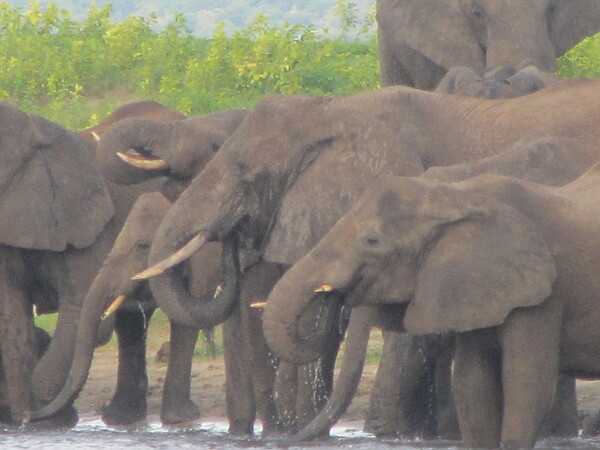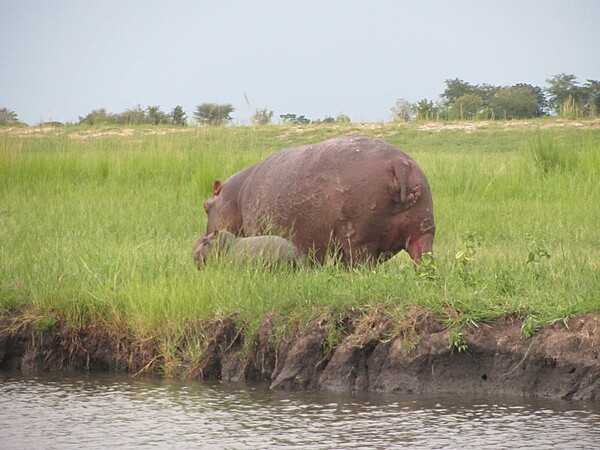Namibia - NA - NAM - NAM - Africa
Last updated: January 06, 2026
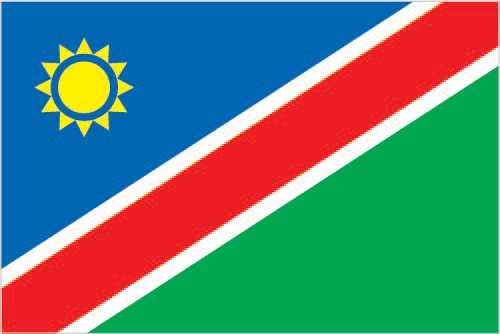
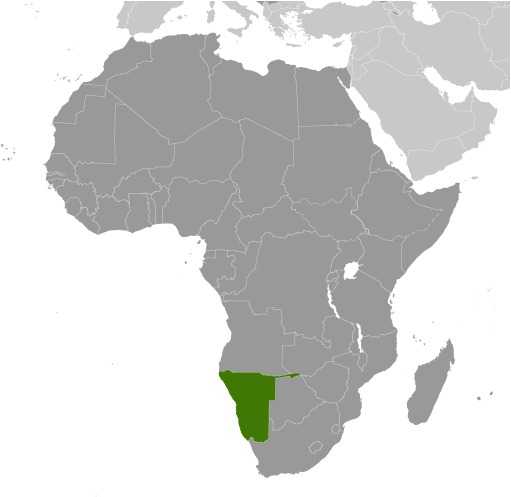
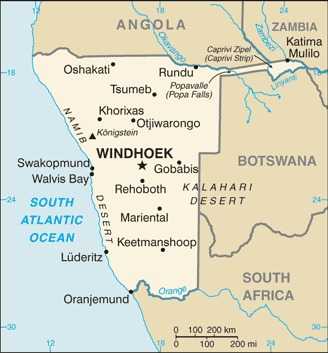
Namibia Images
Namibia Factbook Data
Diplomatic representation from the US
chief of mission: Ambassador John GIORDANO (since 29 October 2025)
embassy: 38 Metje Street, Klein Windhoek, Windhoek
mailing address: 2540 Windhoek Place, Washington DC 20521-2540
telephone: [264] (61) 202-5000
FAX: [264] (61) 202-5219
email address and website:
ConsularWindhoek@state.gov
https://na.usembassy.gov/
embassy: 38 Metje Street, Klein Windhoek, Windhoek
mailing address: 2540 Windhoek Place, Washington DC 20521-2540
telephone: [264] (61) 202-5000
FAX: [264] (61) 202-5219
email address and website:
ConsularWindhoek@state.gov
https://na.usembassy.gov/
Age structure
0-14 years: 34.1% (male 482,790/female 473,306)
15-64 years: 62% (male 846,810/female 890,099)
65 years and over: 3.9% (2024 est.) (male 47,686/female 62,969)
15-64 years: 62% (male 846,810/female 890,099)
65 years and over: 3.9% (2024 est.) (male 47,686/female 62,969)
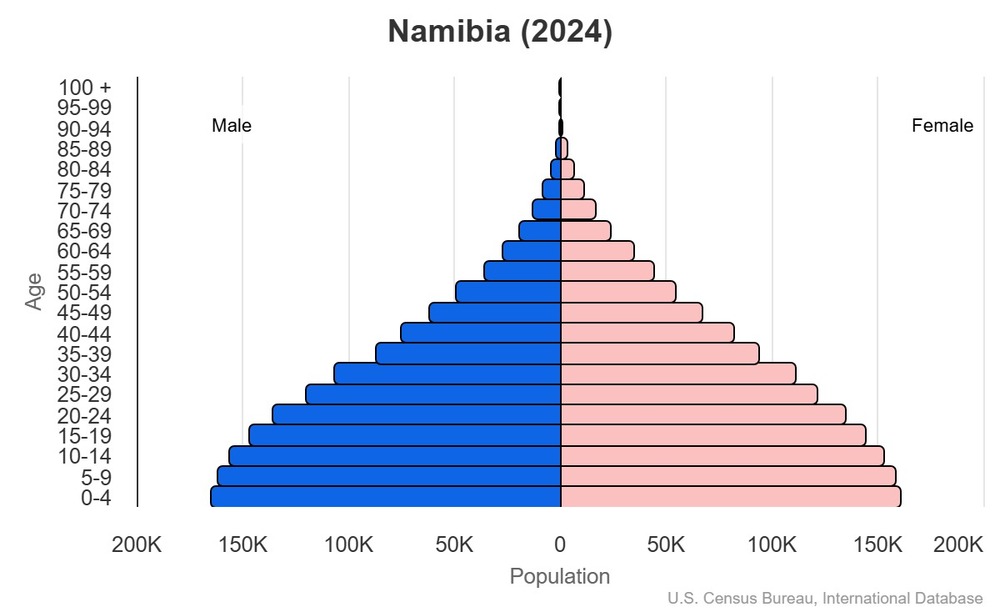
This is the population pyramid for Namibia. A population pyramid illustrates the age and sex structure of a country's population and may provide insights about political and social stability, as well as economic development. The population is distributed along the horizontal axis, with males shown on the left and females on the right. The male and female populations are broken down into 5-year age groups represented as horizontal bars along the vertical axis, with the youngest age groups at the bottom and the oldest at the top. The shape of the population pyramid gradually evolves over time based on fertility, mortality, and international migration trends.
For additional information, please see the entry for Population pyramid on the Definitions and Notes page.
For additional information, please see the entry for Population pyramid on the Definitions and Notes page.
Geographic coordinates
22 00 S, 17 00 E
Sex ratio
at birth: 1.03 male(s)/female
0-14 years: 1.02 male(s)/female
15-64 years: 0.95 male(s)/female
65 years and over: 0.76 male(s)/female
total population: 0.97 male(s)/female (2024 est.)
0-14 years: 1.02 male(s)/female
15-64 years: 0.95 male(s)/female
65 years and over: 0.76 male(s)/female
total population: 0.97 male(s)/female (2024 est.)
Natural hazards
prolonged periods of drought
Area - comparative
almost seven times the size of Pennsylvania; slightly more than half the size of Alaska
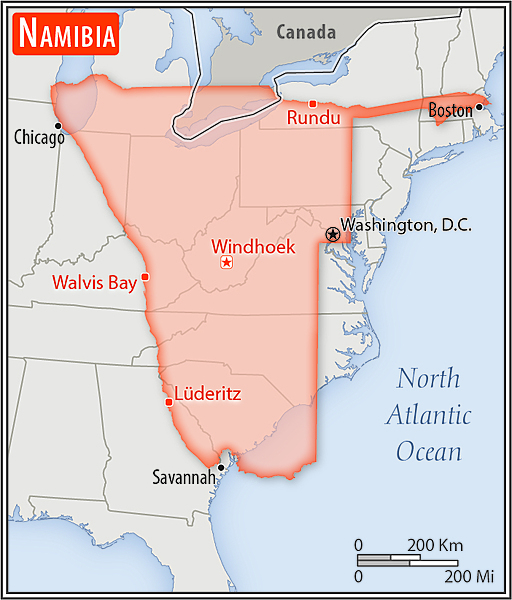
almost seven times the size of Pennsylvania; slightly more than half the size of Alaska
Military service age and obligation
18-25 years of age for men and women for voluntary military service; no conscription (2024)
note: as of 2022, women comprised about 23% of the active-duty military
note: as of 2022, women comprised about 23% of the active-duty military
Background
Various ethnic groups occupied southwestern Africa prior to Germany establishing a colony over most of the territory in 1884. South Africa occupied the colony, then known as German South West Africa, in 1915 during World War I and administered it as a mandate until after World War II, when it annexed the territory. In 1966, the Marxist South-West Africa People's Organization (SWAPO) guerrilla group launched a war of independence for the area that became Namibia, but it was not until 1988 that South Africa agreed to end its administration in accordance with a UN peace plan for the entire region. Namibia gained independence in 1990, and SWAPO has governed it since, although the party has dropped much of its Marxist ideology. President Hage GEINGOB was elected in 2014 in a landslide victory, replacing Hifikepunye POHAMBA, who stepped down after serving two terms. SWAPO retained its parliamentary super majority in the 2014 elections. In 2019 elections, GEINGOB was reelected but by a substantially reduced majority, and SWAPO narrowly lost its super majority in parliament.
Environmental issues
depletion and degradation of water and aquatic resources; desertification; land degradation; loss of biodiversity; wildlife poaching
International environmental agreements
party to: Antarctic-Marine Living Resources, Biodiversity, Climate Change, Climate Change-Kyoto Protocol, Climate Change-Paris Agreement, Comprehensive Nuclear Test Ban, Desertification, Endangered Species, Hazardous Wastes, Law of the Sea, Ozone Layer Protection, Ship Pollution, Wetlands
signed, but not ratified: none of the selected agreements
signed, but not ratified: none of the selected agreements
Military expenditures
2.8% of GDP (2024 est.)
2.8% of GDP (2023 est.)
3% of GDP (2022 est.)
3% of GDP (2021 est.)
3.4% of GDP (2020 est.)
2.8% of GDP (2023 est.)
3% of GDP (2022 est.)
3% of GDP (2021 est.)
3.4% of GDP (2020 est.)
Population below poverty line
17.4% (2015 est.)
note: % of population with income below national poverty line
note: % of population with income below national poverty line
Household income or consumption by percentage share
lowest 10%: 1% (2015 est.)
highest 10%: 47.2% (2015 est.)
note: % share of income accruing to lowest and highest 10% of population
highest 10%: 47.2% (2015 est.)
note: % share of income accruing to lowest and highest 10% of population
Exports - commodities
gold, diamonds, radioactive chemicals, fish, refined petroleum (2023)
note: top five export commodities based on value in dollars
note: top five export commodities based on value in dollars
Exports - partners
South Africa 27%, China 12%, Botswana 8%, Belgium 7%, France 5% (2023)
note: top five export partners based on percentage share of exports
note: top five export partners based on percentage share of exports
Administrative divisions
14 regions; Erongo, Hardap, //Karas, Kavango East, Kavango West, Khomas, Kunene, Ohangwena, Omaheke, Omusati, Oshana, Oshikoto, Otjozondjupa, Zambezi
note: the Karas region was renamed //Karas in 2013 to include the alveolar lateral click of the Khoekhoegowab language
note: the Karas region was renamed //Karas in 2013 to include the alveolar lateral click of the Khoekhoegowab language
Agricultural products
root vegetables, milk, maize, beef, grapes, onions, wheat, fruits, pulses, vegetables (2023)
note: top ten agricultural products based on tonnage
note: top ten agricultural products based on tonnage
Military and security forces
Namibian Defense Force (NDF): Namibian Army, Namibian Navy, Namibian Air Force (2025)
note: the Namibian Police Force is under the Ministry of Home Affairs, Immigration, Safety, and Security; it has a paramilitary Special Field Force responsible for protecting borders and government installations
note: the Namibian Police Force is under the Ministry of Home Affairs, Immigration, Safety, and Security; it has a paramilitary Special Field Force responsible for protecting borders and government installations
Budget
revenues: $4.415 billion (2023 est.)
expenditures: $4.779 billion (2023 est.)
note: central government revenues (excluding grants) and expenditures converted to US dollars at average official exchange rate for year indicated
expenditures: $4.779 billion (2023 est.)
note: central government revenues (excluding grants) and expenditures converted to US dollars at average official exchange rate for year indicated
Capital
name: Windhoek
geographic coordinates: 22 34 S, 17 05 E
time difference: UTC+2 (7 hours ahead of Washington, DC, during Standard Time)
etymology: the name is an Afrikaans word meaning "windy corner;" a local Khoikhoin chief first used the name in the 19th century and may have derived it from the name of his childhood South African village of Winterhoek
geographic coordinates: 22 34 S, 17 05 E
time difference: UTC+2 (7 hours ahead of Washington, DC, during Standard Time)
etymology: the name is an Afrikaans word meaning "windy corner;" a local Khoikhoin chief first used the name in the 19th century and may have derived it from the name of his childhood South African village of Winterhoek
Imports - commodities
refined petroleum, copper ore, ships, electricity, trucks (2023)
note: top five import commodities based on value in dollars
note: top five import commodities based on value in dollars
Climate
desert; hot, dry; rainfall sparse and erratic
Coastline
1,572 km
Constitution
history: adopted 9 February 1990, entered into force 21 March 1990
amendment process: passage requires majority vote of the National Assembly membership and of the National Council of Parliament and assent of the president of the republic; if the National Council fails to pass an amendment, the president can call for a referendum; passage by referendum requires two-thirds majority of votes cast; amendments that detract from or repeal constitutional articles on fundamental rights and freedoms cannot be amended, and the requisite majorities needed by Parliament to amend the constitution cannot be changed
amendment process: passage requires majority vote of the National Assembly membership and of the National Council of Parliament and assent of the president of the republic; if the National Council fails to pass an amendment, the president can call for a referendum; passage by referendum requires two-thirds majority of votes cast; amendments that detract from or repeal constitutional articles on fundamental rights and freedoms cannot be amended, and the requisite majorities needed by Parliament to amend the constitution cannot be changed
Exchange rates
Namibian dollars (NAD) per US dollar -
Exchange rates:
18.329 (2024 est.)
18.446 (2023 est.)
16.356 (2022 est.)
14.779 (2021 est.)
16.463 (2020 est.)
Exchange rates:
18.329 (2024 est.)
18.446 (2023 est.)
16.356 (2022 est.)
14.779 (2021 est.)
16.463 (2020 est.)
Flag
description: a wide red stripe edged with narrow white stripes divides the flag diagonally from lower-left corner to upper-right corner; the upper triangle is blue and has a golden-yellow, 12-ray sunburst, and the lower triangle is green
meaning: red stands for the heroism of the people and their determination to build a future of equal opportunity; white stands for peace, unity, tranquility, and harmony; blue stands for the sky and the Atlantic Ocean, the sun for power and existence, and green for vegetation and agricultural resources
meaning: red stands for the heroism of the people and their determination to build a future of equal opportunity; white stands for peace, unity, tranquility, and harmony; blue stands for the sky and the Atlantic Ocean, the sun for power and existence, and green for vegetation and agricultural resources
Independence
21 March 1990 (from South African mandate)
Industries
mining, tourism, fishing, agriculture
Judicial branch
highest court(s): Supreme Court (consists of the chief justice and at least 3 judges in quorum sessions)
judge selection and term of office: judges appointed by the president of Namibia on the recommendation of the Judicial Service Commission; judges serve until age 65, but terms can be extended by the president until age 70
subordinate courts: High Court; Electoral Court, Labor Court; regional and district magistrates' courts; community courts
judge selection and term of office: judges appointed by the president of Namibia on the recommendation of the Judicial Service Commission; judges serve until age 65, but terms can be extended by the president until age 70
subordinate courts: High Court; Electoral Court, Labor Court; regional and district magistrates' courts; community courts
Land boundaries
total: 4,220 km
border countries (4): Angola 1,427 km; Botswana 1,544 km; South Africa 1,005 km; Zambia 244 km
border countries (4): Angola 1,427 km; Botswana 1,544 km; South Africa 1,005 km; Zambia 244 km
Land use
agricultural land: 47.1% (2023 est.)
arable land: 1% (2023 est.)
permanent crops: 0% (2023 est.)
permanent pasture: 46.2% (2023 est.)
forest: 9.8% (2023 est.)
other: 43.1% (2023 est.)
arable land: 1% (2023 est.)
permanent crops: 0% (2023 est.)
permanent pasture: 46.2% (2023 est.)
forest: 9.8% (2023 est.)
other: 43.1% (2023 est.)
Legal system
mixed system of uncodified civil law based on Roman-Dutch law and customary law
Legislative branch
legislature name: Parliament
legislative structure: bicameral
legislative structure: bicameral
Literacy
total population: 87.6% (2023 est.)
male: 87.9% (2023 est.)
female: 87.4% (2023 est.)
male: 87.9% (2023 est.)
female: 87.4% (2023 est.)
Maritime claims
territorial sea: 12 nm
contiguous zone: 24 nm
exclusive economic zone: 200 nm
contiguous zone: 24 nm
exclusive economic zone: 200 nm
International organization participation
ACP, AfDB, AU, C, CD, CPLP (associate observer), FAO, G-77, IAEA, IBRD, ICAO, ICCt, ICRM, IDA, IFAD, IFC, IFRCS, ILO, IMF, IMO, Interpol, IOC, IOM, IPU, ISO, ITSO, ITU, ITUC (NGOs), MIGA, NAM, OPCW, SACU, SADC, UN, UNAMID, UNCTAD, UNESCO, UNHCR, UNHRC, UNIDO, UNISFA, UNMIL, UNMISS, UNOCI, UNWTO, UPU, WCO, WHO, WIPO, WMO, WTO
National holiday
Independence Day, 21 March (1990)
Nationality
noun: Namibian(s)
adjective: Namibian
adjective: Namibian
Natural resources
diamonds, copper, uranium, gold, silver, lead, tin, lithium, cadmium, tungsten, zinc, salt, hydropower, fish
note: suspected deposits of oil, coal, and iron ore
note: suspected deposits of oil, coal, and iron ore
Geography - note
the Namib Desert, after which the country is named, is considered to be the oldest desert in the world; some 14% of the land is protected, including virtually the entire Namib Desert coastal strip
Economic overview
upper middle-income, export-driven Sub-Saharan economy; natural resource rich; Walvis Bay port expansion for trade; high potential for renewable power generation and energy independence; major nature-based tourist locale; natural resource rich; shortage of skilled labor
Political parties
All People's Party or APP
Christian Democratic Voice or CDV
Landless People's Movement or LPM
National Unity Democratic Organization or NUDO
Namibian Economic Freedom Fighters or NEFF
Popular Democratic Movement or PDM (formerly Democratic Turnhalle Alliance or DTA)
Rally for Democracy and Progress or RDP
Republican Party or RP
South West Africa National Union or SWANU
South West Africa People's Organization or SWAPO
United Democratic Front or UDF
United People's Movement or UPM
Christian Democratic Voice or CDV
Landless People's Movement or LPM
National Unity Democratic Organization or NUDO
Namibian Economic Freedom Fighters or NEFF
Popular Democratic Movement or PDM (formerly Democratic Turnhalle Alliance or DTA)
Rally for Democracy and Progress or RDP
Republican Party or RP
South West Africa National Union or SWANU
South West Africa People's Organization or SWAPO
United Democratic Front or UDF
United People's Movement or UPM
Railways
total: 2,628 km (2014)
narrow gauge: 2,628 km (2014) 1.067-m gauge
narrow gauge: 2,628 km (2014) 1.067-m gauge
Suffrage
18 years of age; universal
Terrain
mostly high plateau; Namib Desert along coast; Kalahari Desert in east
Government type
presidential republic
Country name
conventional long form: Republic of Namibia
conventional short form: Namibia
local long form: Republic of Namibia
local short form: Namibia
former: German South-West Africa (Deutsch-Suedwestafrika), South-West Africa
etymology: named for the coastal Namib Desert; the word namib comes from the local Nama language and means "an area where there is nothing"
conventional short form: Namibia
local long form: Republic of Namibia
local short form: Namibia
former: German South-West Africa (Deutsch-Suedwestafrika), South-West Africa
etymology: named for the coastal Namib Desert; the word namib comes from the local Nama language and means "an area where there is nothing"
Location
Southern Africa, bordering the South Atlantic Ocean, between Angola and South Africa
Map references
Africa
Irrigated land
80 sq km (2012)
Internet users
percent of population: 64% (2023 est.)
Internet country code
.na
GDP (official exchange rate)
$13.372 billion (2024 est.)
note: data in current dollars at official exchange rate
note: data in current dollars at official exchange rate
Total renewable water resources
39.91 billion cubic meters (2022 est.)
Urbanization
urban population: 54.9% of total population (2023)
rate of urbanization: 3.64% annual rate of change (2020-25 est.)
rate of urbanization: 3.64% annual rate of change (2020-25 est.)
Broadcast media
1 private and 1 state-run TV station; satellite and cable TV service available; state-run radio broadcasts in multiple languages; about a dozen private radio stations; transmissions of multiple international broadcasters available
Drinking water source
improved:
urban: 96.2% of population (2022 est.)
rural: 73.8% of population (2022 est.)
total: 85.9% of population (2022 est.)
unimproved:
urban: 3.8% of population (2022 est.)
rural: 26.2% of population (2022 est.)
total: 14.1% of population (2022 est.)
urban: 96.2% of population (2022 est.)
rural: 73.8% of population (2022 est.)
total: 85.9% of population (2022 est.)
unimproved:
urban: 3.8% of population (2022 est.)
rural: 26.2% of population (2022 est.)
total: 14.1% of population (2022 est.)
National anthem(s)
title: "Namibia, Land of the Brave"
lyrics/music: Axali DOESEB
history: adopted 1991
lyrics/music: Axali DOESEB
history: adopted 1991
This is an audio of the National Anthem for Namibia. The national anthem is generally a patriotic musical composition - usually in the form of a song or hymn of praise - that evokes and eulogizes the history, traditions, or struggles of a nation or its people. National anthems can be officially recognized as a national song by a country's constitution or by an enacted law, or simply by tradition. Although most anthems contain lyrics, some do not.
Major urban areas - population
477,000 WINDHOEK (capital) (2023)
International law organization participation
has not submitted an ICJ jurisdiction declaration; accepts ICCt jurisdiction
National symbol(s)
oryx (antelope)
Mother's mean age at first birth
21.6 years (2013 est.)
note: data represents median age at first birth among women 25-49
note: data represents median age at first birth among women 25-49
GDP - composition, by end use
household consumption: 79.3% (2024 est.)
government consumption: 21.5% (2024 est.)
investment in fixed capital: 23.7% (2024 est.)
investment in inventories: 1.9% (2024 est.)
exports of goods and services: 41.6% (2024 est.)
imports of goods and services: -68% (2024 est.)
note: figures may not total 100% due to rounding or gaps in data collection
government consumption: 21.5% (2024 est.)
investment in fixed capital: 23.7% (2024 est.)
investment in inventories: 1.9% (2024 est.)
exports of goods and services: 41.6% (2024 est.)
imports of goods and services: -68% (2024 est.)
note: figures may not total 100% due to rounding or gaps in data collection
Dependency ratios
total dependency ratio: 61.4 (2024 est.)
youth dependency ratio: 55 (2024 est.)
elderly dependency ratio: 6.4 (2024 est.)
potential support ratio: 15.7 (2024 est.)
youth dependency ratio: 55 (2024 est.)
elderly dependency ratio: 6.4 (2024 est.)
potential support ratio: 15.7 (2024 est.)
Citizenship
citizenship by birth: no
citizenship by descent only: at least one parent must be a citizen of Namibia
dual citizenship recognized: no
residency requirement for naturalization: 5 years
citizenship by descent only: at least one parent must be a citizen of Namibia
dual citizenship recognized: no
residency requirement for naturalization: 5 years
Population distribution
population density is very low, with the largest clusters found in the extreme north-central area along the border with Angola, as shown in this population distribution map
Electricity access
electrification - total population: 56.2% (2022 est.)
electrification - urban areas: 74.8%
electrification - rural areas: 33.2%
electrification - urban areas: 74.8%
electrification - rural areas: 33.2%
Civil aircraft registration country code prefix
V5
Sanitation facility access
improved:
urban: 70.6% of population (2022 est.)
rural: 23.6% of population (2022 est.)
total: 49% of population (2022 est.)
unimproved:
urban: 29.4% of population (2022 est.)
rural: 76.4% of population (2022 est.)
total: 51% of population (2022 est.)
urban: 70.6% of population (2022 est.)
rural: 23.6% of population (2022 est.)
total: 49% of population (2022 est.)
unimproved:
urban: 29.4% of population (2022 est.)
rural: 76.4% of population (2022 est.)
total: 51% of population (2022 est.)
Ethnic groups
Ovambo 50%, Kavangos 9%, Herero 7%, Damara 7%, mixed European and African ancestry 6.5%, European 6%, Nama 5%, Caprivian 4%, San 3%, Baster 2%, Tswana 0.5%
Religions
Christian 97.5%, other 0.6% (includes Muslim, Baha'i, Jewish, Buddhist), unaffiliated 1.9% (2020 est.)
Languages
Oshiwambo languages 49.7%, Nama/Damara 11%, Kavango languages 10.4%, Afrikaans 9.4%, Herero languages 9.2%, Zambezi languages 4.9%, English (official) 2.3%, other African languages 1.5%, other European languages 0.7%, other 1% (2016 est.)
note: Namibia has 13 recognized national languages, including 10 indigenous African languages and 3 European languages
note: Namibia has 13 recognized national languages, including 10 indigenous African languages and 3 European languages
Imports - partners
South Africa 36%, China 9%, India 7%, UAE 4%, USA 3% (2023)
note: top five import partners based on percentage share of imports
note: top five import partners based on percentage share of imports
Refugees and internally displaced persons
refugees: 6,575 (2024 est.)
IDPs: 1,399 (2024 est.)
stateless persons: 14,796 (2024 est.)
IDPs: 1,399 (2024 est.)
stateless persons: 14,796 (2024 est.)
Elevation
highest point: Konigstein on Brandberg 2,573 m
lowest point: Atlantic Ocean 0 m
mean elevation: 1,141 m
lowest point: Atlantic Ocean 0 m
mean elevation: 1,141 m
Physician density
0.55 physicians/1,000 population (2022)
Health expenditure
9.4% of GDP (2021)
11.7% of national budget (2022 est.)
11.7% of national budget (2022 est.)
Military - note
the NDF’s primary responsibility is defending Namibia's territorial integrity and national interests; other responsibilities include support to civil authorities and participating in peace and stability missions under the African Union, Southern African Development Community, and the UN; Namibia has bilateral defense ties with several countries, including Botswana, India, South Africa, Tanzania, and Zambia
the NDF was created in 1990, largely from demobilized former members of the People's Liberation Army of Namibia (PLAN) and the South West Africa Territorial Force (SWATF); the PLAN was the armed wing of the South West Africa People’s Organization (SWAPO), while SWATF was an auxiliary of the South African Defense Force and comprised the armed forces of the former South West Africa, 1977-1989; from 1990-1995, the British military assisted with the forming and training the NDF (2025)
the NDF was created in 1990, largely from demobilized former members of the People's Liberation Army of Namibia (PLAN) and the South West Africa Territorial Force (SWATF); the PLAN was the armed wing of the South West Africa People’s Organization (SWAPO), while SWATF was an auxiliary of the South African Defense Force and comprised the armed forces of the former South West Africa, 1977-1989; from 1990-1995, the British military assisted with the forming and training the NDF (2025)
Military and security service personnel strengths
estimated 12,000 active Namibian Defense Forces (2025)
Total water withdrawal
municipal: 61.568 million cubic meters (2022 est.)
industrial: 18.61 million cubic meters (2022 est.)
agricultural: 201 million cubic meters (2022 est.)
industrial: 18.61 million cubic meters (2022 est.)
agricultural: 201 million cubic meters (2022 est.)
Waste and recycling
municipal solid waste generated annually: 256,700 tons (2024 est.)
percent of municipal solid waste recycled: 19.6% (2022 est.)
percent of municipal solid waste recycled: 19.6% (2022 est.)
Major aquifers
Lower Kalahari-Stampriet Basin, Upper Kalahari-Cuvelai-Upper Zambezi Basin
Major watersheds (area sq km)
Atlantic Ocean drainage: Orange (941,351 sq km)
Indian Ocean drainage: Zambezi (1,332,412 sq km)
Internal (endorheic basin) drainage: Okavango Basin (863,866 sq km)
Indian Ocean drainage: Zambezi (1,332,412 sq km)
Internal (endorheic basin) drainage: Okavango Basin (863,866 sq km)
Major rivers (by length in km)
Zambezi (shared with Zambia [s]), Angola, Botswana, Zimbabwe, and Mozambique [m]) - 2,740 km; Orange river mouth (shared with Lesotho [s], and South Africa) - 2,092 km; Okavango (shared with Angola [s], and Botswana [m]) - 1,600 km
note: [s] after country name indicates river source; [m] after country name indicates river mouth
note: [s] after country name indicates river source; [m] after country name indicates river mouth
National heritage
total World Heritage Sites: 2 (1 cultural, 1 natural)
selected World Heritage Site locales: Twyfelfontein or /Ui-//aes (c); Namib Sand Sea (n)
selected World Heritage Site locales: Twyfelfontein or /Ui-//aes (c); Namib Sand Sea (n)
Coal
consumption: 24,000 metric tons (2023 est.)
exports: 900 metric tons (2023 est.)
imports: 26,000 metric tons (2023 est.)
proven reserves: 350 million metric tons (2023 est.)
exports: 900 metric tons (2023 est.)
imports: 26,000 metric tons (2023 est.)
proven reserves: 350 million metric tons (2023 est.)
Electricity generation sources
fossil fuels: 1.9% of total installed capacity (2023 est.)
solar: 26.9% of total installed capacity (2023 est.)
wind: 1.2% of total installed capacity (2023 est.)
hydroelectricity: 70% of total installed capacity (2023 est.)
solar: 26.9% of total installed capacity (2023 est.)
wind: 1.2% of total installed capacity (2023 est.)
hydroelectricity: 70% of total installed capacity (2023 est.)
Natural gas
proven reserves: 62.297 billion cubic meters (2021 est.)
Petroleum
refined petroleum consumption: 23,000 bbl/day (2023 est.)
Currently married women (ages 15-49)
33.7% (2018 est.)
Remittances
1.1% of GDP (2024 est.)
1% of GDP (2023 est.)
0.7% of GDP (2022 est.)
note: personal transfers and compensation between resident and non-resident individuals/households/entities
1% of GDP (2023 est.)
0.7% of GDP (2022 est.)
note: personal transfers and compensation between resident and non-resident individuals/households/entities
Ports
total ports: 2 (2024)
large: 0
medium: 0
small: 2
very small: 0
ports with oil terminals: 2
key ports: Luderitz Bay, Walvis Bay
large: 0
medium: 0
small: 2
very small: 0
ports with oil terminals: 2
key ports: Luderitz Bay, Walvis Bay
Legislative branch - lower chamber
chamber name: National Assembly
number of seats: 104 (96 directly elected; 8 appointed)
electoral system: proportional representation
scope of elections: full renewal
term in office: 5 years
most recent election date: 11/27/2024 to 11/30/2024
parties elected and seats per party: SWAPO Party (51); Independent Patriots of Change (IPC) (20); Affirmative Repositioning (AR) (6); Landless People's Movement (LPM) (5); Popular Democratic Movement (PDM) (5); Other (9)
percentage of women in chamber: 42.3%
expected date of next election: November 2029
number of seats: 104 (96 directly elected; 8 appointed)
electoral system: proportional representation
scope of elections: full renewal
term in office: 5 years
most recent election date: 11/27/2024 to 11/30/2024
parties elected and seats per party: SWAPO Party (51); Independent Patriots of Change (IPC) (20); Affirmative Repositioning (AR) (6); Landless People's Movement (LPM) (5); Popular Democratic Movement (PDM) (5); Other (9)
percentage of women in chamber: 42.3%
expected date of next election: November 2029
Legislative branch - upper chamber
chamber name: National Council
number of seats: 42 (all indirectly elected)
electoral system: proportional representation
term in office: 5 years
most recent election date: 12/15/2020
percentage of women in chamber: 14.3%
expected date of next election: December 2025
note: the Council primarily reviews legislation passed and referred by the National Assembly
number of seats: 42 (all indirectly elected)
electoral system: proportional representation
term in office: 5 years
most recent election date: 12/15/2020
percentage of women in chamber: 14.3%
expected date of next election: December 2025
note: the Council primarily reviews legislation passed and referred by the National Assembly
National color(s)
blue, red, green, white, yellow
Particulate matter emissions
11.8 micrograms per cubic meter (2019 est.)
Methane emissions
energy: 2.1 kt (2022-2024 est.)
agriculture: 193.6 kt (2019-2021 est.)
waste: 13.7 kt (2019-2021 est.)
other: 0.9 kt (2019-2021 est.)
agriculture: 193.6 kt (2019-2021 est.)
waste: 13.7 kt (2019-2021 est.)
other: 0.9 kt (2019-2021 est.)
Labor force
1.131 million (2024 est.)
note: number of people ages 15 or older who are employed or seeking work
note: number of people ages 15 or older who are employed or seeking work
Youth unemployment rate (ages 15-24)
total: 37.3% (2024 est.)
male: 36.7% (2024 est.)
female: 38% (2024 est.)
note: % of labor force ages 15-24 seeking employment
male: 36.7% (2024 est.)
female: 38% (2024 est.)
note: % of labor force ages 15-24 seeking employment
Maternal mortality ratio
139 deaths/100,000 live births (2023 est.)
Reserves of foreign exchange and gold
$3.356 billion (2024 est.)
$2.956 billion (2023 est.)
$2.803 billion (2022 est.)
note: holdings of gold (year-end prices)/foreign exchange/special drawing rights in current dollars
$2.956 billion (2023 est.)
$2.803 billion (2022 est.)
note: holdings of gold (year-end prices)/foreign exchange/special drawing rights in current dollars
Public debt
4.64% of GDP (2019 est.)
note: central government debt as a % of GDP
note: central government debt as a % of GDP
Unemployment rate
19.2% (2024 est.)
19.4% (2023 est.)
19.7% (2022 est.)
note: % of labor force seeking employment
19.4% (2023 est.)
19.7% (2022 est.)
note: % of labor force seeking employment
Population
total: 2,803,660 (2024 est.)
male: 1,377,286
female: 1,426,374
male: 1,377,286
female: 1,426,374
Carbon dioxide emissions
3.46 million metric tonnes of CO2 (2023 est.)
from coal and metallurgical coke: 48,000 metric tonnes of CO2 (2023 est.)
from petroleum and other liquids: 3.412 million metric tonnes of CO2 (2023 est.)
from coal and metallurgical coke: 48,000 metric tonnes of CO2 (2023 est.)
from petroleum and other liquids: 3.412 million metric tonnes of CO2 (2023 est.)
Area
total : 824,292 sq km
land: 823,290 sq km
water: 1,002 sq km
land: 823,290 sq km
water: 1,002 sq km
Taxes and other revenues
33% (of GDP) (2023 est.)
note: central government tax revenue as a % of GDP
note: central government tax revenue as a % of GDP
Real GDP (purchasing power parity)
$31.154 billion (2024 est.)
$30.039 billion (2023 est.)
$28.761 billion (2022 est.)
note: data in 2021 dollars
$30.039 billion (2023 est.)
$28.761 billion (2022 est.)
note: data in 2021 dollars
Airports
259 (2025)
Telephones - mobile cellular
total subscriptions: 2.6 million (2023 est.)
subscriptions per 100 inhabitants: 113 (2022 est.)
subscriptions per 100 inhabitants: 113 (2022 est.)
Gini Index coefficient - distribution of family income
59.1 (2015 est.)
note: index (0-100) of income distribution; higher values represent greater inequality
note: index (0-100) of income distribution; higher values represent greater inequality
Inflation rate (consumer prices)
4.2% (2024 est.)
5.9% (2023 est.)
6.1% (2022 est.)
note: annual % change based on consumer prices
5.9% (2023 est.)
6.1% (2022 est.)
note: annual % change based on consumer prices
Current account balance
-$2.055 billion (2024 est.)
-$1.893 billion (2023 est.)
-$1.605 billion (2022 est.)
note: balance of payments - net trade and primary/secondary income in current dollars
-$1.893 billion (2023 est.)
-$1.605 billion (2022 est.)
note: balance of payments - net trade and primary/secondary income in current dollars
Real GDP per capita
$10,300 (2024 est.)
$10,100 (2023 est.)
$10,000 (2022 est.)
note: data in 2021 dollars
$10,100 (2023 est.)
$10,000 (2022 est.)
note: data in 2021 dollars
Broadband - fixed subscriptions
total: 104,000 (2023 est.)
subscriptions per 100 inhabitants: 4 (2023 est.)
subscriptions per 100 inhabitants: 4 (2023 est.)
Tobacco use
total: 11.8% (2025 est.)
male: 20.5% (2025 est.)
female: 3.9% (2025 est.)
male: 20.5% (2025 est.)
female: 3.9% (2025 est.)
Obesity - adult prevalence rate
17.2% (2016)
Energy consumption per capita
21.734 million Btu/person (2023 est.)
Electricity
installed generating capacity: 646,000 kW (2023 est.)
consumption: 3.891 billion kWh (2023 est.)
exports: 169 million kWh (2023 est.)
imports: 2.917 billion kWh (2023 est.)
transmission/distribution losses: 747.409 million kWh (2023 est.)
consumption: 3.891 billion kWh (2023 est.)
exports: 169 million kWh (2023 est.)
imports: 2.917 billion kWh (2023 est.)
transmission/distribution losses: 747.409 million kWh (2023 est.)
Merchant marine
total: 15 (2023)
by type: general cargo 1, other 14
by type: general cargo 1, other 14
Imports
$9.199 billion (2024 est.)
$8.443 billion (2023 est.)
$7.43 billion (2022 est.)
note: balance of payments - imports of goods and services in current dollars
$8.443 billion (2023 est.)
$7.43 billion (2022 est.)
note: balance of payments - imports of goods and services in current dollars
Exports
$5.887 billion (2024 est.)
$5.729 billion (2023 est.)
$5.361 billion (2022 est.)
note: balance of payments - exports of goods and services in current dollars
$5.729 billion (2023 est.)
$5.361 billion (2022 est.)
note: balance of payments - exports of goods and services in current dollars
Heliports
1 (2025)
Telephones - fixed lines
total subscriptions: 81,000 (2023 est.)
subscriptions per 100 inhabitants: 3 (2023 est.)
subscriptions per 100 inhabitants: 3 (2023 est.)
Alcohol consumption per capita
total: 2.38 liters of pure alcohol (2019 est.)
beer: 1.37 liters of pure alcohol (2019 est.)
wine: 0.16 liters of pure alcohol (2019 est.)
spirits: 0.53 liters of pure alcohol (2019 est.)
other alcohols: 0.32 liters of pure alcohol (2019 est.)
beer: 1.37 liters of pure alcohol (2019 est.)
wine: 0.16 liters of pure alcohol (2019 est.)
spirits: 0.53 liters of pure alcohol (2019 est.)
other alcohols: 0.32 liters of pure alcohol (2019 est.)
Life expectancy at birth
total population: 65.9 years (2024 est.)
male: 64.2 years
female: 67.6 years
male: 64.2 years
female: 67.6 years
Real GDP growth rate
3.7% (2024 est.)
4.4% (2023 est.)
5.4% (2022 est.)
note: annual GDP % growth based on constant local currency
4.4% (2023 est.)
5.4% (2022 est.)
note: annual GDP % growth based on constant local currency
Industrial production growth rate
1% (2024 est.)
note: annual % change in industrial value added based on constant local currency
note: annual % change in industrial value added based on constant local currency
GDP - composition, by sector of origin
agriculture: 7.3% (2024 est.)
industry: 28.9% (2024 est.)
services: 54.5% (2024 est.)
note: figures may not total 100% due to non-allocated consumption not captured in sector-reported data
industry: 28.9% (2024 est.)
services: 54.5% (2024 est.)
note: figures may not total 100% due to non-allocated consumption not captured in sector-reported data
Education expenditure
9.1% of GDP (2024 est.)
24.6% national budget (2025 est.)
24.6% national budget (2025 est.)
Military equipment inventories and acquisitions
the NDF's inventory consists mostly of Soviet-era weapons and equipment; over the past decade, it has received a limited number of newer weapons systems from China and South Africa; Namibia has a small defense industry that produces items such as armored personnel carriers (2025)
Diplomatic representation in the US
chief of mission: Ambassador Wilbard HELLAO (since 16 December 2025)
chancery: 1605 New Hampshire Avenue NW, Washington, DC 20009
telephone: [1] (202) 986-0540
FAX: [1] (202) 986-0443
email address and website:
info@namibiaembassyusa.org
https://namibiaembassyusa.org/
chancery: 1605 New Hampshire Avenue NW, Washington, DC 20009
telephone: [1] (202) 986-0540
FAX: [1] (202) 986-0443
email address and website:
info@namibiaembassyusa.org
https://namibiaembassyusa.org/
Executive branch
chief of state: President Netumbo NANDI-NDAITWAH (since 21 March 2025)
head of government: President Netumbo NANDI-NDAITWAH (since 21 March 2025)
cabinet: Cabinet appointed by the president from among members of the National Assembly
election/appointment process: president directly elected by absolute-majority popular vote in 2 rounds, if needed, for a 5-year term (eligible for a second term)
most recent election date: 27 November 2024
election results:
2024: Netumbo NANDI-NDAITWAH elected president in the first round; percent of vote -Netumbo NANDI-NDAITWAH (SWAPO) 57%, Panduleni ITULA (IPC) 26%, McHenry VENAANI (PDM) 5.10%, Bernadus SWARTBOOI (LPM) 4.72%, Job AMUPANDA (AR) 1.80%, Hendrik GAOBEAB (UDF) 1.16%; other 3.31%
2019: Hage GEINGOB reelected president in the first round; percent of vote - Hage GEINGOB (SWAPO) 56.3%, Panduleni ITULA (independent) 29.4%, McHenry VENAANI (PDM) 5.3%, other .9%
expected date of next election: November 2029
note: the president is both chief of state and head of government
head of government: President Netumbo NANDI-NDAITWAH (since 21 March 2025)
cabinet: Cabinet appointed by the president from among members of the National Assembly
election/appointment process: president directly elected by absolute-majority popular vote in 2 rounds, if needed, for a 5-year term (eligible for a second term)
most recent election date: 27 November 2024
election results:
2024: Netumbo NANDI-NDAITWAH elected president in the first round; percent of vote -Netumbo NANDI-NDAITWAH (SWAPO) 57%, Panduleni ITULA (IPC) 26%, McHenry VENAANI (PDM) 5.10%, Bernadus SWARTBOOI (LPM) 4.72%, Job AMUPANDA (AR) 1.80%, Hendrik GAOBEAB (UDF) 1.16%; other 3.31%
2019: Hage GEINGOB reelected president in the first round; percent of vote - Hage GEINGOB (SWAPO) 56.3%, Panduleni ITULA (independent) 29.4%, McHenry VENAANI (PDM) 5.3%, other .9%
expected date of next election: November 2029
note: the president is both chief of state and head of government
Gross reproduction rate
1.4 (2025 est.)
Net migration rate
0 migrant(s)/1,000 population (2025 est.)
Median age
total: 23.1 years (2025 est.)
male: 22.1 years
female: 23.5 years
male: 22.1 years
female: 23.5 years
Total fertility rate
2.85 children born/woman (2025 est.)
Infant mortality rate
total: 27.1 deaths/1,000 live births (2025 est.)
male: 31 deaths/1,000 live births
female: 24.7 deaths/1,000 live births
male: 31 deaths/1,000 live births
female: 24.7 deaths/1,000 live births
Death rate
6.36 deaths/1,000 population (2025 est.)
Birth rate
23.93 births/1,000 population (2025 est.)
Population growth rate
1.76% (2025 est.)
